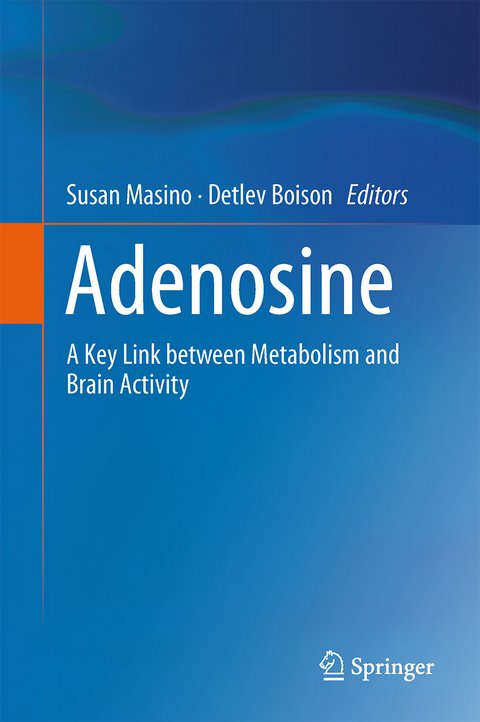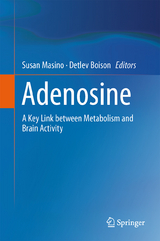Adenosine
Springer-Verlag New York Inc.
978-1-4614-3902-8 (ISBN)
Homeostasis of key metabolites and metabolic health affects all bodily systems. Not surprisingly, altered metabolic function is associated with a wide spectrum of dysfunctions in the central nervous system – including developmental disorders, acute nervous system injury, and neurodegenerative disorders. Accordingly, metabolism-based therapies offer significant promise as new category of treatment options designed to limit, delay or reverse the disease process by reconstructing homeostatic functions. Increasingly it is appreciated that restoring metabolic health could promote normal nervous system activity, and improve behavior and cognition.
Adenosine: A Key Link Between Metabolism and Central Nervous System Activity focusses on diverse aspects of adenosine, an evolutionarily conserved homeostatic bioenergetic regulator in the central nervous system. Because of its interrelationship with ATP (adenosine triphosphate), adenosine is integral to cell metabolism. At the same time, adenosine influences neuronal activity directly via receptors, and is involved in biochemical processes related to gene expression. Thus, adenosine is uniquely placed as a reciprocal and rapid link between changes in metabolism and changes in neuronal activity, and, on a longer time scale, to changes in gene expression and long term changes in cell function. Leaders in the field feature basic research on adenosine at the cellular level in the central nervous system, and relate these findings to its recognized potential in diverse acute and chronic disorders. This comprehensive overview of adenosine also highlights emerging adenosine-based treatments and associated opportunities for central nervous system disorders.
Adenosine and metabolism – a brief historical note.- Adenosine metabolism, adenosine kinase and evolution.- Adenosine and energy metabolism - relationship to brain bioenergetics.- Adenosine and autocrine metabolic regulation of neuronal activity.- Physiologic and metabolic regulation of adenosine – mechanisms.- The double edged sword: gaining adenosine at the expense of ATP. How to balance the books.- Downstream pathways of adenosine.- Astrocytic ATP release.- Role of striatal A2A receptor subpopulations in neurological disorder.- Sleep and adenosine: human studies.- Adenosine and Other Purinergic Products in Circadian Timing.- Adenosine in the immune system.- The bioenergetics network of adenosine in hibernation, sleep and thermoregulation.- Adenosine and stroke.- The many roles of adenosine in traumatic brain injury.- Therapeutic Perspectives of Adenosine Receptor Compounds in Functional Restitutions after Spinal Cord Injury.- Adenosine and pain.- Symptomatic and neuroprotective effects of A2A receptor antagonists in Parkinson’s Disease.- Adenosine receptors and Alzheimer’s Disease.- Adenosine receptors in Huntington’s Disease.- Adenosine and Multiple Sclerosis.- Adenosinergic perspectives on schizophrenia – Opportunity for an integrative synthesis.- The role of adenosine in the ventral striatal circuits regulating behavioral activation and effort-related decision making: Importance for normal and pathological aspects of motivation.- Adenosine and autism: Physiological symptoms and metabolic opportunities.- Stress, Brain Adenosine Signaling, and Fatigue-Related Behavioral Processes.- Disruption of adenosine homeostasis in epilepsy and therapeutic adenosine augmentation.- Ketogenic Diet and Epilepsy: The Role of Adenosine.- Silk – a biocompatible and biodegradable biopolymer for therapeutic adenosine delivery.- Anatomical Distribution of Nucleoside System in the Human Brain and Implications for Therapy.
| Zusatzinfo | XVI, 680 p. |
|---|---|
| Verlagsort | New York, NY |
| Sprache | englisch |
| Maße | 155 x 235 mm |
| Gewicht | 1202 g |
| Themenwelt | Medizin / Pharmazie ► Medizinische Fachgebiete ► Neurologie |
| Medizin / Pharmazie ► Studium | |
| Naturwissenschaften ► Biologie ► Humanbiologie | |
| Naturwissenschaften ► Biologie ► Zoologie | |
| ISBN-10 | 1-4614-3902-7 / 1461439027 |
| ISBN-13 | 978-1-4614-3902-8 / 9781461439028 |
| Zustand | Neuware |
| Haben Sie eine Frage zum Produkt? |
aus dem Bereich




